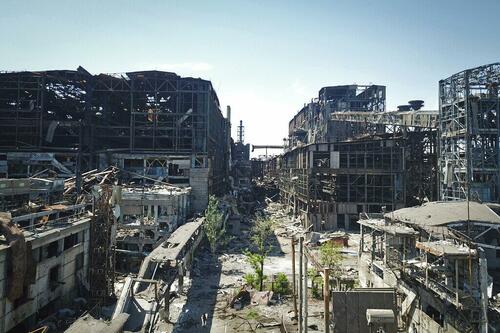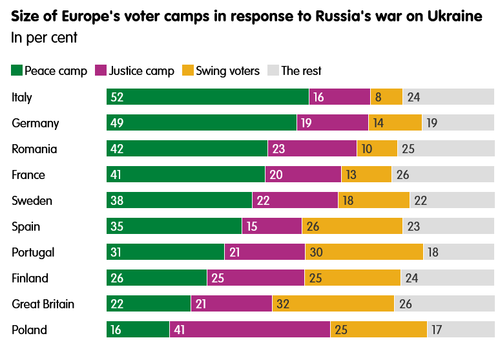
Authored by Magyar Nemzet via Remix News,
Europeans are divided between those who want the war in Ukraine to end as soon as possible, even if that means giving concessions to Russia, and others who believe Russia must be clearly defeated and punished.
According to a survey published on Wednesday by the European Council on Foreign Relations in Berlin, a relative majority of 35 percent of Europeans want a negotiated peace agreement with Russia as soon as possible, while 22 percent of those polled believe the war must continue and the West must refrain from offering Russia any concessions.

The survey polled residents in 10 European countries including the United Kingdom, Finland, France, Poland, Germany, Italy, Portugal, Romania, Spain, and Sweden in mid-May, three months after the war had broken out.
Respondents who want peace as soon as possible are in the majority in all countries except Poland, insisting the war must end even if Ukraine has to make territorial concessions to Russia. Italians are the least concerned about retribution for Russia, with 52 percent of those polled just wanting an end to the conflict that has destabilized the European economy and worsened the cost of living crisis. In contrast, just 16 percent of them would see the war continue.
A similar story can be seen in Germany where 49 percent want peace compared with 16 percent who back a continuation of the war. Romania follows with a 42:23 swing, France with 41:20, and Sweden with 38:22.
In contrast, 41 percent of Poles want Russia defeated and punished with just 16 percent supporting a negotiated peace agreement. In the eyes of most Europeans, there is a clear instigator for the outbreak of the war, with 73 percent of all respondents blaming Russia, while 15 percent believe the blame lies at the feet of Ukraine, the European Union and the United States.

The question of who is the main obstacle to peace does not particularly divide Europeans either. In this case, too, they point to Russia (64 percent), but in the case of Italians, the rate is only 39 percent, while 35 percent blame Ukraine and the West.
Asked whether the war should lead to severing ties with Russia, 50 percent of those who call themselves pro-peace would end all economic ties, 42 percent all cultural ties, and 40 percent all diplomatic ties with Moscow.
It is no surprise that 82 percent of the pro-war camp would ban Russian oil imports into the European Union, 81 percent would supply Ukraine with additional weapons, and 52 percent would send EU troops to defend Ukraine.
In the case of pro-peace parties, 52 percent would support an oil embargo, 47 percent arms transfers to Ukraine, and only 24 percent troop deployments.
Looking at the long-term effects of the war, 61 percent fear a sharp rise in housing costs and energy prices, and the same proportion of respondents worried about Russia’s use of nuclear weapons. The third threat of concern is the use of chemical weapons by Russians (46 percent). Reducing energy dependence on Russia is considered more important by respondents (58 percent) than meeting climate targets (26 percent).
Authored by Magyar Nemzet via Remix News,
Europeans are divided between those who want the war in Ukraine to end as soon as possible, even if that means giving concessions to Russia, and others who believe Russia must be clearly defeated and punished.
According to a survey published on Wednesday by the European Council on Foreign Relations in Berlin, a relative majority of 35 percent of Europeans want a negotiated peace agreement with Russia as soon as possible, while 22 percent of those polled believe the war must continue and the West must refrain from offering Russia any concessions.

The survey polled residents in 10 European countries including the United Kingdom, Finland, France, Poland, Germany, Italy, Portugal, Romania, Spain, and Sweden in mid-May, three months after the war had broken out.
Respondents who want peace as soon as possible are in the majority in all countries except Poland, insisting the war must end even if Ukraine has to make territorial concessions to Russia. Italians are the least concerned about retribution for Russia, with 52 percent of those polled just wanting an end to the conflict that has destabilized the European economy and worsened the cost of living crisis. In contrast, just 16 percent of them would see the war continue.
A similar story can be seen in Germany where 49 percent want peace compared with 16 percent who back a continuation of the war. Romania follows with a 42:23 swing, France with 41:20, and Sweden with 38:22.
In contrast, 41 percent of Poles want Russia defeated and punished with just 16 percent supporting a negotiated peace agreement. In the eyes of most Europeans, there is a clear instigator for the outbreak of the war, with 73 percent of all respondents blaming Russia, while 15 percent believe the blame lies at the feet of Ukraine, the European Union and the United States.

The question of who is the main obstacle to peace does not particularly divide Europeans either. In this case, too, they point to Russia (64 percent), but in the case of Italians, the rate is only 39 percent, while 35 percent blame Ukraine and the West.
Asked whether the war should lead to severing ties with Russia, 50 percent of those who call themselves pro-peace would end all economic ties, 42 percent all cultural ties, and 40 percent all diplomatic ties with Moscow.
It is no surprise that 82 percent of the pro-war camp would ban Russian oil imports into the European Union, 81 percent would supply Ukraine with additional weapons, and 52 percent would send EU troops to defend Ukraine.
In the case of pro-peace parties, 52 percent would support an oil embargo, 47 percent arms transfers to Ukraine, and only 24 percent troop deployments.
Looking at the long-term effects of the war, 61 percent fear a sharp rise in housing costs and energy prices, and the same proportion of respondents worried about Russia’s use of nuclear weapons. The third threat of concern is the use of chemical weapons by Russians (46 percent). Reducing energy dependence on Russia is considered more important by respondents (58 percent) than meeting climate targets (26 percent).







